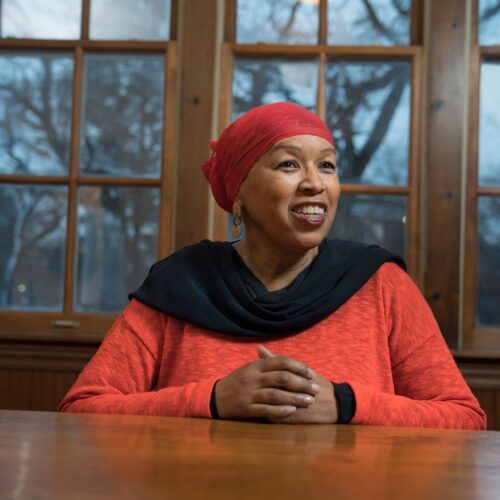Biography
Early Life
Dr. Debra Majeed was a religious historian, activist, and womanist.
She is recognized for her groundbreaking work as a professor of philosophy and religion at Beloit College in Wisconsin.
Born on January 7, 1954, Majeed’s early life was influenced by her exposure to religion.
She grew up in Chicago and was raised in a Catholic family. She attended Catholic schools but later explored various Protestant denominations.
After her family’s move to Los Angeles at the age of sixteen, she studied journalism at Pepperdine University. She wanted to be a sports reporter.
However, facing limited opportunities for women in that field, she transitioned to corporate communications. She worked for notable companies like Sears, Union Bank, and the Los Angeles Times.
Majeed’s path took an unexpected turn when she felt a calling to seminary while working at a church.
She enrolled in a Master’s program in theology at Fuller Evangelical Theological Seminary. She earned her Master of Divinity..
Majeed then served as a minister at Scott United Methodist Church in Pasadena, CA.
Conversion to Islam
During her joint doctoral program at Northwestern University and Garrett-Evangelical Seminary, Majeed became curious about the attraction of Islam to Black people, especially Black men.
This curiosity sparked her interest in researching Islam’s role in Black communities. This eventually led her to embrace the faith herself.
She converted to Islam on May 1, 1998, at the age of 42. Afterward, she began exploring the intersection of gender and Islam in her academic pursuits.
Activism in Education
Majeed’s contributions to academia and activism were extensive.
Joining the faculty at Beloit College in 1999, she taught courses on American religions and gender in Islam.
Majeed’s teaching methodology emphasized “engagement and encountering.”
This gave her students the opportunity to interact with the people and communities they were studying.
She took her students to mosques, civil rights landmarks, and facilitated discussions with Black women writers. This provided them with a broader perspective on race, religion, and social justice.
Religious Advocacy
Majeed’s research and writings focused on the lived experiences of Black Muslim women. She covered their contributions to religious organizations and social change.
She challenged stereotypes and misconceptions about Muslim women. She emphasized their agency, leadership, and diverse practices within the faith.
Her book, Polygyny: What It Means When African American Muslim Women Share Their Husbands, published in 2016, explored the complexities of multiple-wife marriages. It sheds light on the experiences of Black Muslim women.
Community Outreach
Beyond academia, Majeed actively engaged in public outreach and interfaith dialogue.
In response to the negative portrayal of Islam following the events of 9/11, she set up a table in downtown Beloit with a sign that read “Ask a Muslim.” This gave people the opportunity to learn about Islam.
She also conducted talks and workshops on Islam, both locally and nationally, with the aim of fostering understanding and dialogue.
As a leader, Majeed played a vital role in community-building and organizational development. She supported religious leaders and empowered individuals and communities to shape their own destinies.
Majeed’s later years were marked by her dedication to promoting diversity, inclusion, and social justice within the Muslim community and society at large.
She advocated for the recognition of the diverse experiences and contributions of Black Muslim women and challenged patriarchal practices within religious institutions.
Majeed was a passionate advocate for gender equity and the rights of Muslim women, both in the United States and globally.

